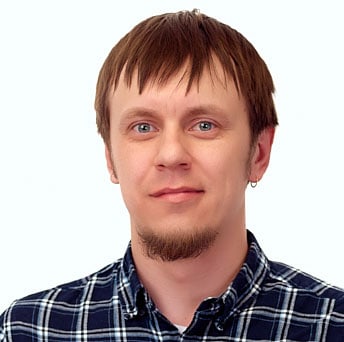
13 min read
Offshore Salesforce Development Team Structure
Salesforce is a leader in the CRM market, leaving Oracle, SAP, and Microsoft far behind. Hordes of companies from all around the world offer Salesforce CRM development services implementation, training, and support.
Indeed, the competition in the Salesforce development services niche is huge. To succeed, your development team must be of an expert level, with precisely distributed roles, transparent responsibilities, and clear objectives.
If you want to build an offshore Salesforce development team, you should fully understand how it’s formed and why. In the article below, we’ll discover the common Salesforce development team roles, as well as the main steps for building an offshore Salesforce development team.
Salesforce logo in the company’s office. Source: Flickr
Offshore Salesforce Team Structure: Roles and Responsibilities
Both Salesforce implementation team structure and its size usually depend on multiple factors: the project, its complexity, scope of work, and the variety of skills needed. Below is the list of some essential Salesforce development team roles:
| No. | Common roles | Number of people required |
| 1 | Salesforce administrator | 1, at least part-time |
| 2 | Salesforce developer | 1+, based on a team size and project scope |
| 3 | Salesforce quality engineer | 1+, based on a team size and project scope |
| 4 | Salesforce business analyst | 1+, at least part-time, based on a team size and project scope |
| 5 | Salesforce consultant (implementation engineer) | 1 |
| 6 | Salesforce platform manager | 1, at least part-time |
| 7 | Salesforce project manager | 1 |
| 8 | Salesforce solution architect | 1, at least part-time |
| 9 | Salesforce technical architect | 1, at least part-time |
Now, let’s review these roles in a more detailed way.
Salesforce Administrator
Salesforce administrators work closely with the client’s staff. This role is essential in ensuring the users get the most out of the Salesforce solution. The main responsibilities of a Salesforce administrator include:
- Providing on-site support
- Monitoring user adoption
- Troubleshooting
- Maintenance of security standards
- Data management
- Analytics delivery
- Some project management activities.
Salesforce administrators should have good communication skills to understand users properly. They also should have industry knowledge, sales skills, and the ability to ask proper questions about business processes. The administrator job can be combined with other roles in small companies or startups with limited resources and immature processes.
Salesforce Developer
A Salesforce developer is a specialist who creates software applications using the Salesforce CRM platform or another Salesforce cloud technology. Their key responsibilities include:
- Developing and implementing technical solutions
- Testing and modifying the system
- Troubleshooting and fixing errors in the code
- Participating in the technical documentation creation
- Collaborating with customers to understand their requirements and project goals
- Providing integration support for seamless application integration, etc.
Among the technical skills that a Salesforce developer is expected to have are knowledge of:
– Basic OOP concepts;
– HTML, CSS, and JavaScript skills;
– Apex and Visualforce frameworks;
– Salesforce Object Query Language (SOQL) and Salesforce Object Search Language (SOSL);
– Web services;
– The ability to manage data and security.
Salesforce Quality Engineer
A Salesforce quality engineer is a role involved in testing software to ensure the solution complies with the technical requirements. The responsibilities of a quality engineer are the following:
- Analyzing customer requirements in terms of QA
- Creating test plans and test cases
- Conducting functional, unit, manual, load, and security testing
- Analyzing test results and providing suggestions on how to improve the solution
- Participating in the code review process.
Salesforce Business Analyst
The Salesforce business analyst is a role focused on business process elicitation, documentation, and improvement. A business analyst is a middleman between a customer and Salesforce developers, constantly contacting the customer.
The Salesforce business analyst collects and analyzes the business processes of the customer. And after that comes up with suggestions on how to improve the efficiency of customer business processes. If we look closely, the business analyst is involved in:
- Analyzing the client needs
- Eliciting, writing, and managing the product requirements
- Analyzing and optimizing the existing business processes
- Creating the software specifications.
Salesforce Consultant (Salesforce Implementation Engineer)
A Salesforce consultant is also called a Salesforce implementation engineer. This role works on the customer’s system improvement, helps customers master the platform, and collects feedback and suggestions on how to enhance the system.
The responsibilities of a salesforce consultant vary from company to company and often include:
- Product configuration
- Requirements gathering
- Creating and managing the project plans
- Managing the relationship with a client.
This is the most important role on the team. The salesforce consultant (or salesforce implementation engineer) basically ensures that the developed technology is implemented according to the processes and that the client’s staff uses it in the right way. Salesforce consultant helps the company to move from the old processes and solutions to new more tech-enabled ones.
Panel discussion at the Salesforce conference
Salesforce Managers: Platform and Project
The Salesforce platform manager plays a crucial role in increasing CRM performance. People in this role are responsible for designing, developing, and implementing applications, extensions, and integrations of the Salesforce solution. A platform manager works closely with stakeholders for eliciting their requirements and transforming their needs into efficient solutions.
The Salesforce project manager is responsible for the project delivery from start to finish. To put it more precisely, a project manager is accountable for all the project processes, the features delivered by the team, and, of course, the deadlines. The main duties for this position include:
- Analysing project requirements
- Assessing project delivery risks and threats
- Creating short-term and long-term goals, plans, and tasks
- Communicating with a customer about timelines and costs
- Keeping track of the Salesforce development team’s performance
- Conducting regular meetings
- Ensuring timely delivery of the project.
Salesforce Architects: Solution and Technical
A Salesforce solution architect is an expert who helps clients create customized solutions for their IT requirements. The main tasks of the Salesforce solution architect are:
- Project presales, communication with the customer
- Identifying their needs and requirements for the project at the highest level
- Examination and evaluation of the current architecture
- Designing the project architecture according to best architectural practices
- Monitoring compliance with project architecture during the development process
- Participation in the maintenance of the technical documentation.
A Salesforce technical architect is an IT specialist who is accountable for the structural design of a Salesforce solution through a prism of project requirements and available resources. The primary responsibilities of a technical architect include:
- Application architecture
- A set of tools and technologies to be used in the system
- Technical review of business requirements.

Signs Your Salesforce Implementation Team Structure is Succesful
How to differentiate a Salesforce development team with experience from any other development team?
| No. | Sign | Detailed description |
| 1 | Salesforce expertise | Salesforce development teams require a specific set of skills and knowledge related to the Salesforce platform, including an understanding of Salesforce’s data model, user interface, and customization options |
| 2 | Vertical expertise | Salesforce development teams are usually specialised in one or several verticals like healthcare, financial, logistics, etc |
| 3 | Salesforce certifications | Experienced Salesforce development teams typically consist of individuals with Salesforce certifications, such as the Salesforce Certified Platform Developer I, which demonstrate their tech expertise in the platform |
| 4 | Focus on scalability and performance | The teams need to consider the scalability and performance of their solutions, as Salesforce is often used to manage large amounts of data and handle high volumes of transactions |
| 5 | Integration with other systems | Salesforce development teams often need to integrate Salesforce with other systems, such as ERP, which often requires previous integration experience |
| 6 | Compliance with Salesforce governance | The teams need to be aware of and comply with Salesforce’s governance policies, including the use of approved managed packages, data archiving, and data security |
| 7 | Testing and deployment | Salesforce development teams need to be able to effectively test and deploy their solutions within the Salesforce ecosystem. Usually, there’s more testing and configuration steps in Salesforce projects than in smaller built-from-scratch projects |
Steps for Building an All-Star Salesforce Development Team
So, we talked about the salesforce development team roles. Now let’s cover the essential steps of building the right salesforce team.
Step 1. Create a plan
It’s always a good idea to create a hiring plan for each role you are interested in. Depending on the project size and deadlines define the requirements for each role. Then determine the budget & timelines for closing each position. It’s key to hire the right people at the right time.
Step 2. Clarify the skills and qualities of ideal candidates
There are two common skill areas that you can rely on when formulating your expectations from the candidate: soft skills and Salesforce-specific skills.
Salesforce office in Vancouver, Canada
Step 3. Pay attention to the certification and qualifications of employees
Salesforce offers the opportunity to earn over 30 certifications for a wide variety of skills. The сertificates demonstrate expertise in a specific area and confirm that the employee is committed to the Salesforce platform. Moreover, the company itself should enable Salesforce specialists to train, build skills, and earn certificates.
Step 4. Prioritize your resources
For smaller Salesforce projects, you don’t need to hire 10 people. Try to find T-shaped individuals that can close multiple roles at once.

Conclusion
An efficient Salesforce development team usually includes a variety of different roles. Some of them are project-specific, and some are common.
Anyway, the process of assembling the Salesforce development team is quite challenging. First of all, it requires people with several different skill sets to check your candidates. Then, you need to prepare several job descriptions for different roles, and then source hordes of candidates. Finally, some roles require niche expertise. As a result, this challenge can potentially take a lot of time with no success guarantee.
Expert Remote is a good alternative. We’ve already sourced and vetted thousands of experts across various engineering and management roles, including Salesforce. You can assemble your salesforce development team with us in just 2–3 weeks, depending on the project’s complexity. Just fill out the contact form, and our account executive will reach out to you.
Remote tech teams & the future of work blog
Remote tech teams & the future of work blog
Your form has been successfully submitted.

